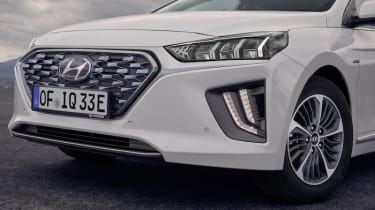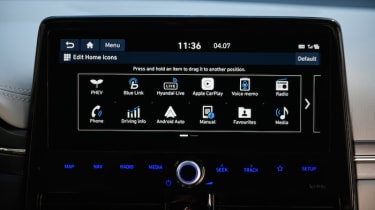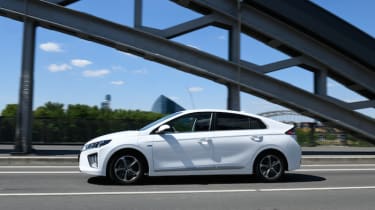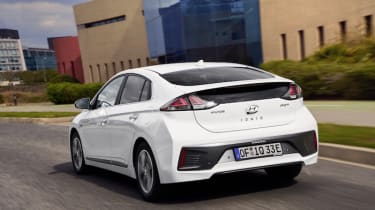New Hyundai Ioniq 2020: specs, prices and prototype drive
Updated Ioniq Hybrid priced from £22,795, Ioniq Plug-In from £29,950 and Ioniq Electric from £29,450

Prices for the updated 2020 model of all three Hyundai Ioniq variants have been released, with the revised Hybrid, Plug-In and Electric versions available to order now.
The first customer deliveries are expected in October. The Hybrid will start from £22,795, the Plug-In from £29,950 and the Electric from £29,450.
The Ioniq Electric gets a battery upgrade, from 28 to 38.3kWh, which Hyundai expects will increase its driving range to 184 miles under the latest WLTP testing procedure. A new 'Eco+' driving mode has been added to the previous Eco, Comfort and Sport choices; it'll help extract the maximum possible range from the car.
A more powerful electric motor (134 compared to 119bhp) also features, while the on-board charger's speed rises from 6.6 to 7.2kW. From a 100kW rapid charger, Hyundai says the new Ioniq Electric will replenish its battery to 80% of capacity in less than an hour.
As before, the Ioniq Hybrid and Ioniq Plug-In combine a 1.6-litre, 104bhp petrol engine with a battery and electric motor. The Hybrid’s electric motor delivers 43bhp and it has a 1.56kWh battery. The Plug-In's electric motor delivers 60bhp and its battery capacity is 8.9kWh.
The maximum combined power output for both the hybrid versions is 139bhp, and both can also travel at up to 75mph on electric power alone. The Hybrid can only run in electric mode for short distances, while the Plug-In can do so for over 30 miles. For the first time, the Hybrid and Plug-In versions also boast manually adjustable regenerative braking technology – something previously only available on the Ioniq Electric.
2020 Hyundai Ioniq Electric prices and specs
The 2020 Ioniq Electric is being offered in Premium (£29,450) and Premium SE (£31,450) specifications, with both prices including the government's plug-in car grant (PiCG). As standard, Premium gets 16-inch alloy wheels, automatic LED headlamps with high-beam assist, LED daytime running lamps and chrome window surrounds, along with a new 10.25-inch touchscreen with sat nav, Apple Car Play and Android Auto.
You also get a wireless charging pad, heated leather steering wheel, heated front seats, power-adjustable driver’s seat lumbar support, auto-dimming rear-view mirror and climate control with this model.
Convenience technology includes a rear-view monitor, adaptive cruise control with stop-go function, rear parking sensors and keyless entry with a start-stop button. Safety features include autonomous emergency braking and driver drowsiness monitoring.
Premium SE adds chrome doorhandles, privacy glass, leather seats, heated and ventilated front seats, a power-operated driver’s seat with memory function, heated rear outermost seats and automatic wipers.
Additional standard safety features include blind-spot monitoring, lane-following assistance and rear cross-traffic alert, while Premium SE also gives buyers the no-cost options of Shale Grey or Electric Shadow trim colours and a cost-option sunroof.
2020 Hyundai Ioniq Plug-In prices and specs
For £29,950, the Ioniq Plug-In Premium includes 16-inch alloy wheels, LED daytime running lamps, LED headlamps with high-beam assist and dusk sensor, rear parking sensors and a chrome window surround. Inside, there's a 10.25-inch touchscreen with sat nav, Apple Car Play and Android Auto, plus a wireless charging pad climate control, a heated leather steering wheel, an auto-dimming rear view mirror, keyless entry, a rear-view monitor and adaptive cruise control.
Cloth seat trim is standard, with the front seats being heated and the driver's seat getting power-adjustable lumbar support. Standard active safety equipment comprises autonomous emergency braking and driver drowsiness monitoring.
Upgrading to the £31,950 Premium SE spec gets you chrome doorhandles, privacy glass, leather seats (with the fronts being heated and ventilated and the driver's power-adjustable), as well as heated rear outermost seats and automatic wipers.
Additional standard safety features include blind-spot monitoring and rear cross-traffic alert. As with the Electric, the Premium SE version of the Plug-In also gives customers the no-cost option of Shale Grey or Red Umber interior trim colours and a cost-option sunroof.
2020 Hyundai Ioniq Hybrid prices and specs
The Ioniq Hybrid has been the best-selling version of the trio since the model's launch in 2016 and with the update for 2020 it's available in four different trim levels.
The entry-level SE Connect costs £22,795: it offers 15-inch alloy wheels with aerodynamic wheel covers, LED daytime running lamps, automatic headlamps with high-beam assist, rear parking sensors, cruise control, a leather steering wheel and cloth seats with powered lumbar support adjustment for the driver.
There's an eight-inch touchscreen multimedia system inside, with Apple Car Play, Android Auto and a rear-view monitor. Safety features include autonomous emergency braking, lane-departure warning, lane-keeping assistance and driver drowsiness monitoring.
Next in the line-up is the Premium, priced from £24,695 and getting a different design of 15-inch alloys, plus LED headlamps, keyless entry, chrome window surrounds, heated front seats and an auto-dimming rear-view mirror. This is also the first Ioniq Hybrid trim level to include the 10.25-inch touchscreen, along with a wireless charging pad.
At £26,995, the Premium SE boasts 17-inch alloys, chrome doorhandles, rear privacy glass and automatic wipers, plus leather seats (heated and ventilated up front, with the driver's seat getting power adjustment). The two outermost rear seats are heated and there's also adaptive cruise control, blind-spot monitoring, lane-following assistance and rear cross-traffic alert. As with the Electric and Plug-In, this trim gives you the no-cost option of Shale Grey or Red Umber interior trim colours and the cost option of a sunroof.
An addition to the regular line-up for the hybrid Ioniq only is the limited-edition 1st Edition specification, priced from £24,955. Based on the Premium trim, the 1st Edition offers enhancements such as 17-inch alloy wheels, an electric parking brake and lane-following assistance from the Premium SE specification for £260 more than the Premium.

Design
Styling changes have been applied to all three revised Ioniqs; the Electric has a fresh design with a closed grille, while the Plug-In and Hybrid get a mesh-look finish (above). All three use active ventilation panels that open and close automatically as required, and have silvered bumpers with sharper-looking LED headlights and taillights.
The Ioniq Hybrid offers a choice of 15- and 17-inch alloy-wheel designs, with 16s available on the Plug-In and Electric. The paint colour range has been expanded, too – there are now nine choices in total, including four new shades: Fluidic Metal, Electric Shadow, Liquid Sand and Typhoon Silver.
Inside, the dashboard design has been changed, with a touch-sensitive panel low down in the middle to operate the climate control and a large fixed screen in the centre for the new infotainment system (see below). There's also stylish mood lighting and new seat-trim colours.

Technology, app and infotainment
Previously, the various versions of the Ioniq, as well as the Hyundai Kona Electric, have been criticised for lacking a smartphone app to control and schedule charging, as offered with several other electric and plug-in hybrid vehicles.
This is addressed in the new 2020 models, which come with a Hyundai BlueLink infotainment system and linked smartphone app. This allows Ioniq Electric drivers to remotely start and stop the car, while all versions allow remote locking and unlocking, as well as control of the air-con, through the app. With the Plug-In and Electric variants, the app allows you to remotely check the status of the battery, as well as remotely control and schedule charging.
To go with the app, the Ioniq's on-board infotainment system has also been updated: a fixed 10.25-inch display screen (above) is now standard on all but the Hybrid Connect SE entry-level specification, featuring voice recognition and customisable 'widgets' for various functions, along with Android Auto, Apple CarPlay and Bluetooth functionality.
Other equipment highlights include the latest iteration of Hyundai’s SmartSense safety pack, including front collision warning, lane-keeping assistance and auto-dipping headlights as standard. As detailed above, lane-following assistance and smart cruise control are available on some trims, allowing the Ioniq to maintain a set distance to the car ahead and automatically come to a complete stop if required.

2020 Hyundai Ioniq prototype review
DrivingElectric recently had the opportunity to drive almost production-ready prototypes of the revised and updated Ioniq Hybrid and Ioniq Plug-In on roads near to Hyundai's European headquarters in Frankfurt, Germany.
With an unchanged power output of 139bhp from the 1.6-litre engine and the same dual-clutch automatic transmission as before, the two hybrid Ioniqs drive pretty much as their predecessors did, with the only difference of note being the addition of regenerative braking controls.
In its strongest setting, this system offers the possibility of 'one-pedal' driving, similar to the 'e-Pedal' setup in the current Nissan Leaf. After a few miles getting used to it, with sufficient anticipation, it's possible to bring the car to a stop merely by lifting off the accelerator at the right time, recuperating significant energy in the process.
The lightest setting feels barely any different to just lifting off the throttle in a car without regenerative braking, but is quite effective in slow, stop-start traffic, while the middle setting offers an appropriate compromise between the two extremes.
The Ioniq is a quiet car inside, but overall comfort could be better, as the ride quality isn't perfectly smooth and the seats could be more supportive – they're firm but quite flat. On the move, the new infotainment system is easy to use, and the ability to configure the display to show the information most important to you is very welcome.
These updates to the Ioniq hybrids definitely improve their efficiency and convenience, then, but they haven't made what's always been a fairly unexciting car to drive any more interesting. The more powerful and longer-range Electric is a more interesting proposition, but we're yet to drive it.
Most Popular

Where can I buy hydrogen and where is my nearest hydrogen filling station?

New Alfa Romeo Junior: the baby electric SUV formerly known as Milano

Audi RS e-tron GT gets big improvements and welcome changes

